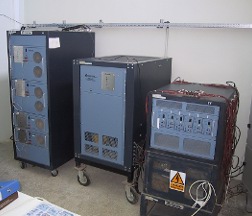CENTRE FOR RENEWABLE ENERGY SOURCES AND SAVING (CRES)
The Centre for Renewable Energy Sources and Saving (CRES) is the Greek national centre for Renewable Energy Sources (RES), Rational Use of Energy (RUE) and Energy Saving (ES). CRES was instituted as the national coordination centre in its areas of activity by the Law 2244/94 (Production of Electricity from RES). CRES is a public entity, supervised by the Ministry of Environment, Energy and Climate Change, having, nevertheless, financial and administrative independence. During the twenty years of its operation CRES has participated in more than 600 European and national projects. Today CRES has a scientific staff of more than 120 highly experienced and specialized scientists and engineers. CRES is a member of European and international networks of similar organizations, such as: EnR, MEDENER, FEDARENE, Energy Cities, EUFORES, OPET, EUREC Agency, Efficiency 2000, etc. CRES cooperates with large international organizations such as IEA, UNESCO, ISES, PLEA, IEC, CEN/CENELEC, etc. The Department of PV and Distributed Generation Systems of CRES is part of the Division of Renewable Energy Sources (RESD). RESD employs 40 scientists and engineers, focusing its activities on the design, support and execution of European and national RTD&D programs for the development of economically viable and environmentally friendly RES/RUE/ES technologies. The department of PV and DG systems is involved in applied research, mainly at the Balance of System level. Within this activity, the Hybrid system/Microgrid test site and PV systems Laboratory have been developed. These facilities have the capability to conduct characterization testing and experimental procedures according to international standards. The Department of PV and DG systems cooperates systematically with organisations for the promotion of PV technology and Distributed Generation, such as EPIA and actively participates in European initiatives, e.g. the Electricity Networks of the Future (Smart Grids) and the European Technology Platforms for Photovoltaics (PV-TRAC) etc. as well as in the preparation of the thematic priorities of FP7.
DER Test Facility (DER-TF) of CRES - Battery testing lab (pdf)
DER Test Facility (DER-TF) of CRES - PV testing lab (pdf)
DER Test Facility (DER-TF) of CRES - Hybrid Power Plant and Microgrid laboratory (pdf)
DER Test Facility (DER-TF) of CRES - Power electronics lab (pdf)
Services offered by CRES Installations (pdf)
Research Activities of CRES (pdf)
More information can be found at ww.cres.gr.






